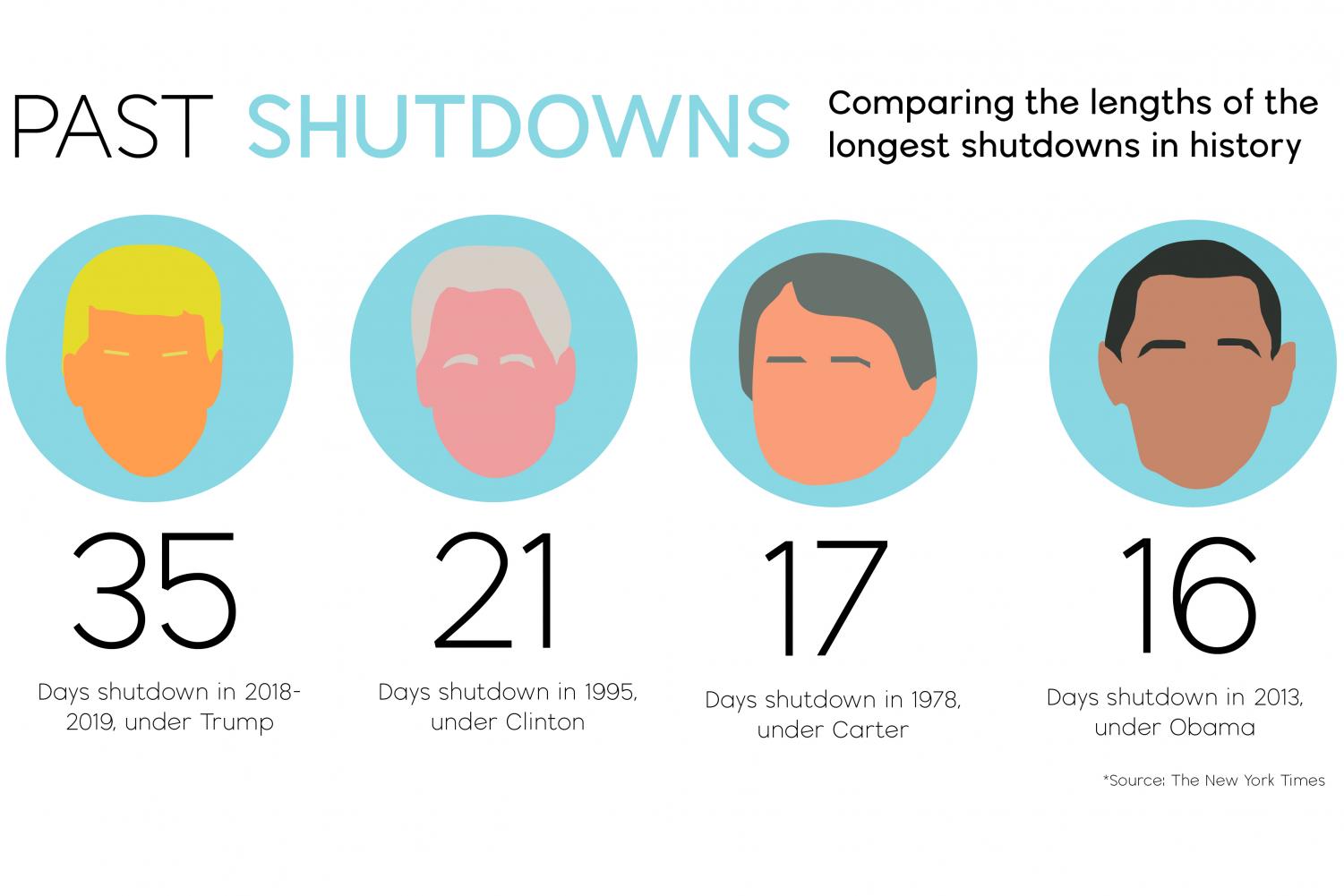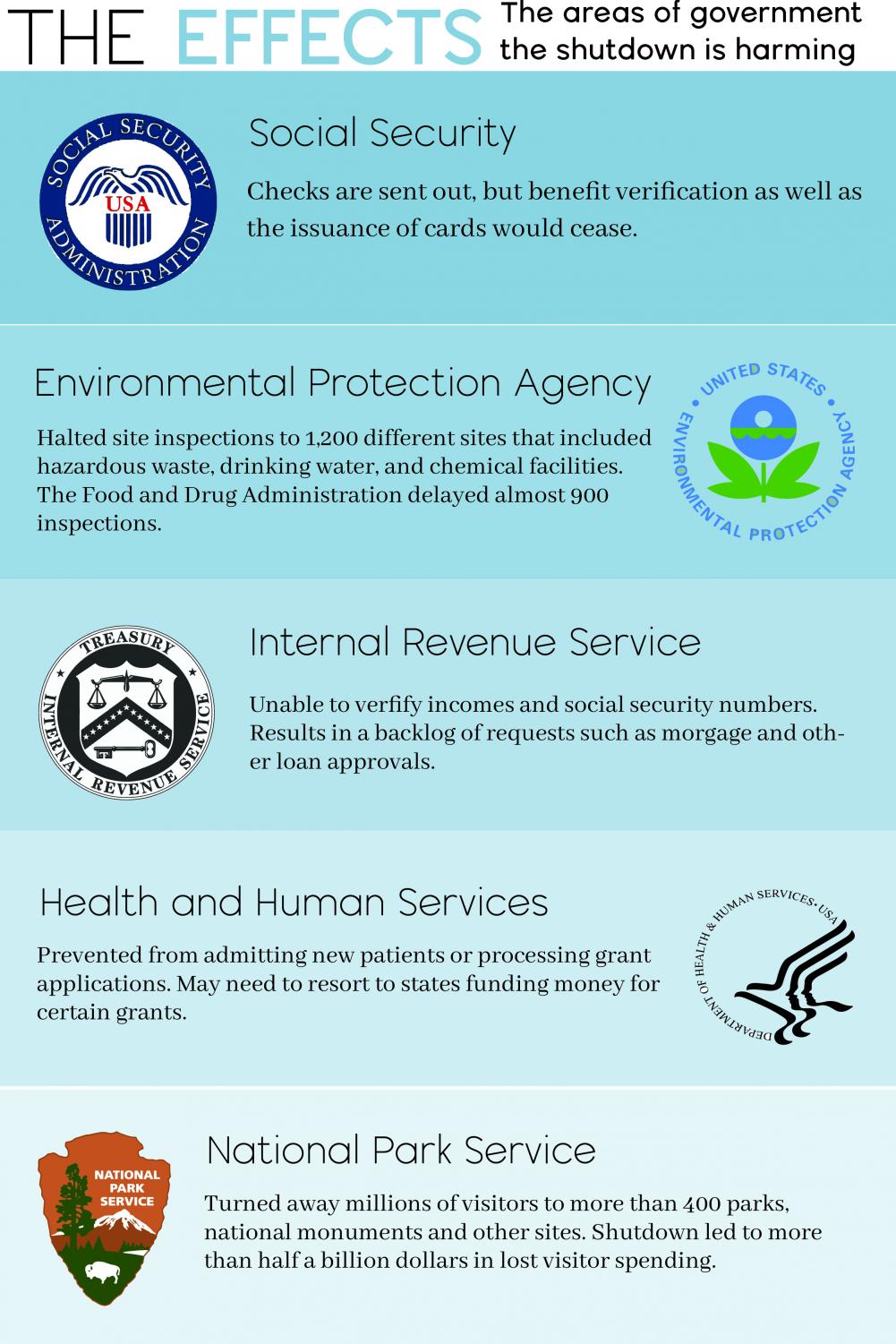Longest government shutdown in history affects student body in many aspects of their lives
After 35 days, the government shutdown ended on Friday, Jan. 25 with the passing of a temporary spending bill
The government shutdown has affected many families such as the Hayes family whose father, Scott Hayes, was furloughed over the course of the shutdown. “My dad is a furloughed government employee,” said senior Josie Hayes. “He is nonessential and has not been allowed to work at all during the shutdown.”
January 29, 2019
After 35 days, the longest government shutdown in U.S history ended on Friday, Jan. 25. The reopening is only temporary, though, as the continuing resolution only funds the government for 21 days.
According to the Committee for a Responsible Federal Budget, the majority of government agencies and programs rely on funding appropriations made by Congress. The shutdown occurred after a budget wasn’t approved due to debates over $5.7 billion worth of funding for a border wall. The continuing resolution did not provide funds for the wall, but President Donald Trump announced he anticipates Congress will approve increase spending for border security; if a negotiation isn’t reached, President Trump has said he’d use executive power.

During a shutdown, the federal Office of Management and Budget enacts a plan that identifies which government activities may not continue unless appropriations are restored; usually, “essential services” affecting public safety continue to operate. Around 380,000 federal employees were furloughed, or forced into a leave of absence. Another 420,000 were required to report to work. It’s unclear when the workers will receive their back pay now that the shutdown is over.
Senior Josie Hayes and sophomore Gwyneth Hayes, whose father Scott Hayes works for the Environmental Protection Agency, were impacted both financially and in everyday life.
“Our family [spent] a lot more time together since my dad never [left] the house and the rest of us [couldn’t] really go anywhere that costs money,” Josie said. “On the downside, my parents have been very stressed and are often grumpy, but we’re all understanding and know that they are handling it all very well given the situation.”
Josie believes the shutdown caused her father to partake in stress-induced activities in order to solidify their financial security.
“He’s been trying to find a lot of random ways to get money. My favorite started about a week into the shutdown when my mom found out he’d been trying to sell all of our belongings for a ridiculously high price on Craigslist,” Josie said. “My mom made him take half of it down because it either had sentimental value or was something we needed, but he still has quite a bit up. He has yet to make a sale.”
Todd Phillips, the father of sophomore Ryan Phillips and senior Abby Phillips, also works for the Environmental Protection Agency. Ryan feels that his dad has grown accustomed to government shutdowns, so their effects aren’t prominent.
“We [weren’t] really affected a ton by the shutdown,” Phillips said. “My dad has been working in government for many years. We’re kind of used to [shutdowns] because it’s not an out of ordinary thing. It’s not that uncommon.”

The list of students affected aren’t limited to familial ties. For example, senior Libby Mullican was impacted by the lack of resources available to alleviate a personal issue. Mullican was born in China and adopted at a young age, however, she’s struggling with financial aid for her undergraduate studies due to the Free Application for Federal Student Aid mistakenly flagging her social security number as a non-citizen.
“Since I was flagged and notified in December, I have worked to clear up my legal status. This included contacting my local representative to file a HIPPA release form,” Mullican said.
“I submitted my form. The only problem was that the form couldn’t be processed and corrected because the government was shutdown.”
Mullican believes that, whatever the solution, a new, long-term spending bill needs to be passed immediately to effectively avoid a shutdown.
“I am concerned about how prolonged this shutdown was. If the government shuts down again [on Friday, Feb. 15], I worry about the thousands of people who have already gone without a paycheck, our national parks and national security,” Mullican said. “It looks like there is no end in sight based off of how each side of the aisle is acting.”













